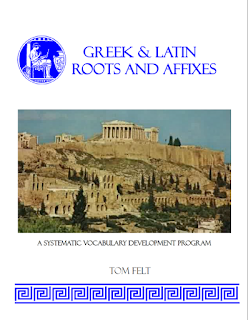Vocabulary! Vocabulary! Vocabulary! It's all about the words, the building blocks of language. Students with larger vocabularies understand better what they read and write more fluently with greater precision and depth. Vocabulary study is the first line of offense in helping your students excel in language arts. Research shows us that the lack of vocabulary acquisition in early education has a tremendous impact on later learning (30 Million Word Gap). Direct instruction of grade-level appropriate vocabulary, word study (roots & affixes), and effective use of context clues should be the corner stones of any language arts teacher's instructional modality.
Roots & Affixes
If students know something of the bits and pieces from which a great many English words are comprised, then when they encounter a new word they are better prepared to analyze its parts to formulate definition of the whole. Try Greek and Latin Roots & Affixes from Fletopia Press. Seven units chocked full of high level exercises, complete with PowerPoint presentations of the roots and affixes fro each unit so that you can present them visually and orally. You can try it out Unit 1 for free.
Context Clue Strategies
Students need to be given the tools to determine the meanings of words in context. In addition to recognizing the roots and prefixes/suffixes from Greek and Latin, recognizing textual clue is the next most important tool in developing higher reading comprehension. Feltopia Press offers a context clue package of four exercises that will provide your students with high-level practice of this important skill.

